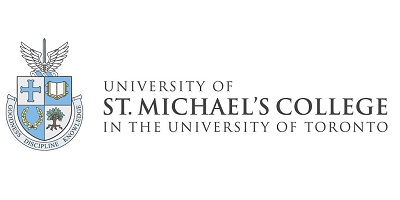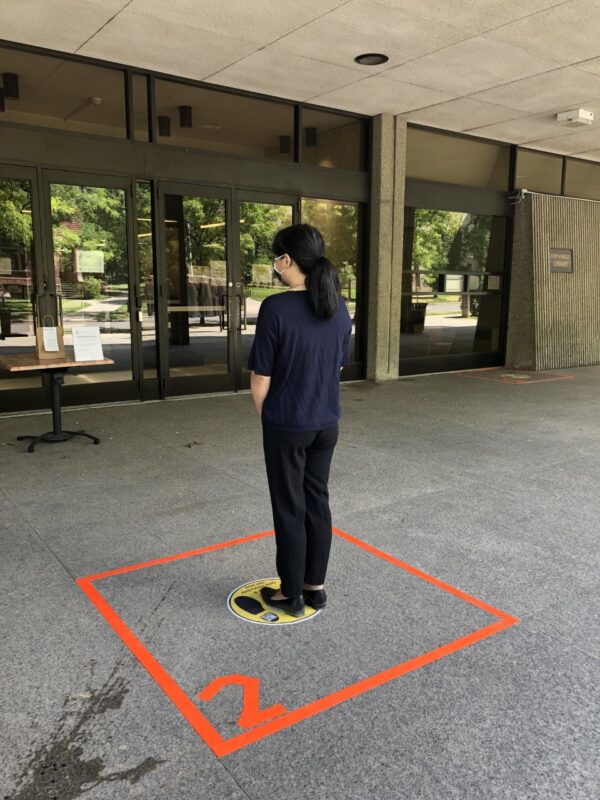When the Print Studio in the John M. Kelly Library re-opens later this month, it will offer students an opportunity to roll up their sleeves and get their hands dirty as they learn about moveable type and the process of printing.
The hands-on experience is designed to lend students an enhanced appreciation for the thought that goes into creating all manner of printed materials, with discussions on design theory, print structures, book history, and our personal engagement with the tangible.
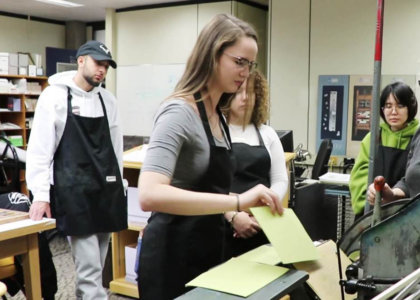
While we live in an era where digital books and printing is everywhere, the printed word remains a powerful touchstone to everything from emotions to a sense of history, says James Roussain, the interim William D. Sharpe Chief Librarian at the John M. Kelly Library. Think of an inscription in a book from a deceased loved one, the magazine with a cover noting a significant moment in history, filed away for posterity, or the joy of perusing shelves in a bookstore. Books and other types of printed materials, like posters or ephemera, he adds, are even used to decorate, a powerful indicator of what a person values and sees as esthetically pleasing.
The re-launch represents the fruition of years of planning for, and dreaming about, a space where experiential learning can help students understand the power and importance of the printed word. The original studio opened in 2002, but was closed in recent years, awaiting repairs and renovations. Over those years, the studio published three chapbooks, small pamphlet–stitched booklets.
“The pieces have come together for a better integrated program, with a more welcoming space,” says Roussain. “We have created a comfortable environment for students, with better ventilation and more space for printing demonstrations or student engagement. Recent renovations have doubled the footprint of the studio and bumped up the number of seats to 24.”
Working in the studio, students will have the opportunity to design layouts and set type, choose inks and papers, and print using the library’s collection of 19th-century printing presses. Future courses will also teach students how to bind books using traditional and modern methods. “We want students to explore the incredible variety of crafts that together make up the book arts,” says Roussain.
The Print Studio builds on the Kelly Library’s collections of rare book and archival materials. Not only can students see and handle examples of printing from its earliest days, they can also learn and sample methods of production, quickly discovering the complexities of the art and its impact on our lives.
The studio, located on the second floor of Kelly in Rm. 233, houses a variety of 19th- and 20th-century printing presses. Surrounding the presses are type cases– wooden drawers full of metal type, painstakingly set in the presses by hand, while shelves ringing the room are loaded with ink and the various other items needed to bring the presses to life.
Roussain says there are many people to thank for the improved studio space, from the Friends of the Kelly Library, who donated $18,000 towards the renovations, through to the energy and vision of St. Michael’s Principal Irene Morra, who has worked to create new links between the studio and course offerings available in the Book and Media Studies program.
The studio re-launch takes place on Thursday, March 21 at 6 p.m., beginning with a lecture in Room 105 of Kelly Library offered by Victoria University Principal Angela Esterhammer and titled “Stranger than Fiction: Scottish Emigrants and Print Culture in the 1820s.” A reception will follow, and then a demonstration in the Print Studio, led by Kit MacNeil, who teaches a course in St Michael’s Book & Media Studies program and serves as Master Printer at the University of Toronto’s Massey College. All are welcome to attend.
A significant donation of archival materials from the Scarboro Foreign Mission Society to the University of St. Michael’s College will help preserve the order’s history, both local and global, in a permanent home while further cementing the John M. Kelly Library’s as the preeminent location for research into the history of religious communities in Canada.
“The Kelly Library is thrilled to have been entrusted to care for the records of the Scarboro Foreign Mission Society,” says Interim William D. Sharpe Chief Librarian James Roussain. “These important materials, which are textual, photographic, and digital, are a natural fit at St. Mike’s and help the Kelly Library advance its mission as a research centre in Catholic history.”
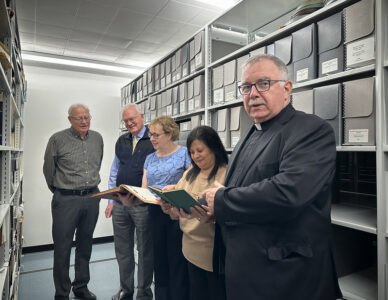
Approximately 100 linear metres of archival records arrived at the library in August, documenting work done by the organization since its founding in 1918, including material on missions in pre-Cultural Revolution China, Latin American, the Caribbean, Africa, and Canada.
The donation also includes a financial pledge, which will support a contract archivist, as well as the purchase of space-efficient shelving to offer improved access to researchers, ensuring the records are stored in a way that ensures their continued preservation.
The library plans to use the archival contents periodically in exhibitions, with the first exhibit planned for January 2025.
This donation aligns with the mandate of the John M. Kelly Library’s Special Collections and complements existing materials within the Kelly Library’s collections, says Roussain, noting that the Henri J. M. Nouwen Research Archives & Special Collection, also housed at the Kelly Library, is called upon from researchers from around the world.
Recently, the Sisters of Service also reached an agreement with the University to have their archives relocated to the Kelly Library, offering researchers an invaluable view into the Sisters’ work with immigrants to Canada, as well as rural communities in Western Canada.
The archival donation from the Scarboro Foreign Mission Society comes as the order repositions itself. In 2017, with no new vocations on the horizon, the order determined it would wind down over the coming years, with most of its members moving to Presentation Manor, a retirement home for lay and religious in Scarborough, and any vocation inquiries redirected to other communities.
“After we moved from our headquarters on Kingston Road in 2018, the archives were housed temporarily at Presentation Manor, says Fr. David Warren, sfm, Secretary General of the Scarboro Foreign Mission Society. “We are delighted that our archives now have a permanent home and are happy to know that the library will take excellent care of our archives in its Special Collections section. We are even happier to know that our history will be available to researchers and that our photos will be displayed periodically to the public. The Scarboro Foreign Mission Society made a good choice when we placed our archives in the care of St. Michael’s.”
The archival donation follows the Scarboro Foreign Mission’s donation to St. Michael’s to assist the Faculty of Theology in creating its Diploma in Interfaith Dialogue, which launched in 2019.
“The Scarboro Foreign Mission Society is an important friend to St. Michael’s and we are honoured to help carry their mission forward by sharing their charism and their history,” says University President David Sylvester.
Roussain offers thanks to his colleagues in Special Collections for their work on the project, adding, “We look forward to welcoming a new audience to our library to see these unique materials.”
Pictured above: Superior General Fr. Ronald MacDonell, SFM (far right), Vicar General and Treasurer General Fr. John Carten, SFM (far left); Councillor and Secretary General Fr. David Warren, SFM (second from left); Ms. Janet Ainslie, Director of Operations and Chief Financial Officer, Canadian Religious Stewardship; and Ms. Nadine Palmer, Treasurer’s Office Administrator at Scarboro Missions
James Roussain is currently Interim Chief Librarian at the John M. Kelly Library. He joined the Library staff in 2017. Prior to that, James worked at Scotiabank, where he was involved in the maintenance and deployment of the corporate records management program. James is a past president of the Archives Association of Ontario (AAO) and the Toronto Area Archivists’ Group (TAAG). In his spare time, he is pursuing a Master of Education in Higher Education at the Ontario Institute for Studies in Education (OISE). He holds a Master of Information degree from the University of Toronto’s Faculty of Information.
Although we were able to keep our doors open for most of the last school year and come ready with years of experience, the Kelly Library is feeling some back-to-school jitters as we approach the new semester. A lot has changed. What is in store for us this coming year?
The biggest question being asked around the library right now is focused on our students: What will they need? Our role on campus has long been to help our students reach their academic potential. We are here to help by offering research consultations, lending books, media, and technology, and offering a quiet and comfortable place to gather and study. This is our wheelhouse–at least we think it is. After two-plus years of online learning, are we now out of our depth? How have the needs of our incoming students changed?
After more than two years of online learning there is little doubt that our users are now comfortable operating in a wholly new environment than where we left off in the “before times.” As everyone returns to campus this fall, we must be ready to adapt to new expectations of the campus library. For some students—say those who were in Grade 10 in March of 2020—two years of online learning has meant that, for many of them, this may be their first time approaching an academic library. Do they know what we can offer? How can we help them navigate this new and often intimidating world?
We can take comfort in two things. The first is that while we may be nervous about a return to in-person work and meeting the needs of a changed student body, so too are the students. Openly acknowledging the challenges of reacquainting with the university experience is a good icebreaker. Second, the Kelly Library can certainly rely on our slate of services, collections, and in-house expertise. While we look openly to understanding how we can engage students in the academic process, we remain ready to go. Here are a few highlights and updates on where we stand as of September 2022.
Looking to learn from our experience hosting online services, we are restructuring many of our core offerings with an eye to improving accessibility and to meet students where they are (both physically and in an academic sense). All our research and writing consultations will be offered in a hybrid model, where students will be able to choose whether they wish to meet online or in person in the library. Our academic librarians have met with more students over the last two years than since we began tracking these things. There was a clear need to improve accessibility and we hope that being able to meet online going forward will continue this trend. For those who seek a quiet refuge on campus, all our study spaces—including our group study rooms—will be fully open as of September and we welcome all members of our community to come visit and say hello.
We are also looking forward to further welcoming students enrolled within the Regis St. Michael’s federation. While students from all colleges have been welcome to avail themselves of our services and collections, the new federation and the corresponding excitement on campus have caused us to look for
new ways of engaging our community more broadly. For those of you who are new to the Kelly Library, welcome, and we look forward to seeing you around the stacks.
Ultimately, our role on campus—both within the library and more broadly among faculty and staff—is to stay abreast of trends within teaching and learning. The last few years have been a challenge for all of us, perhaps more so for our students, as we faced an accelerated period of change. If anything, this has taught me to stop and listen. Listen to what our students are saying, listen to their frustrations—cameras off is okay!—and seek to understand how we can help them succeed. If we all take a similar stance, I am confident we can smooth the transition to an in-person university experience for all of us. The librarians and staff at the Kelly Library are ready, and we look forward to seeing you all again soon.

Read other InsightOut posts.
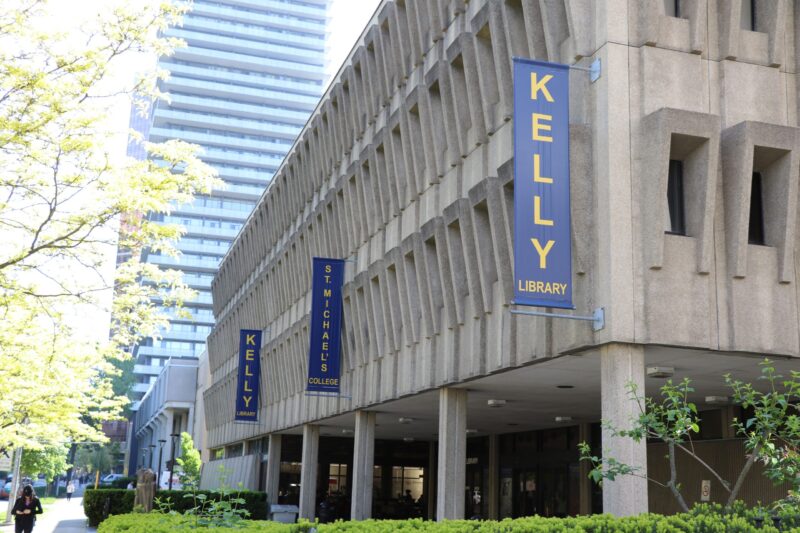
The story behind the William D. Sharpe Chief Librarian position at the John M. Kelly Library is proof that acts of kindness can have profound consequences.
Dr. William Sharpe, who left a bequest for the position, was actually a student of Victoria College, St. Mike’s neighbour to the north. But Sharpe was a fan of Kelly Library, in large part because of Fr. John Kelly himself.
Dr. Chris Ricci, whose father was a lifelong friend of Sharpe’s, notes that Fr. Kelly was very kind to William in his student days, listening to him and becoming a key influence in his life.
Fr. Kelly, Ricci recalls, approached Chris’s father, who lived in Sullivan House at St. Michael’s before graduating from medical school in 1951, and said, “Elio, there is a boy over there, reading under the tree. He’s an orphan. Make friends and take care of him.”
Sharpe became one of Ricci Sr.’s closest friends, “part of our family, my Uncle Bill. Their friendship was lifelong. He maintained his loyalty to St. Mike’s because of Fr. Kelly and developed a relationship with the library,” a cause very close to his heart, Ricci adds.
“Fr. Kelly became like an adopted uncle to Bill,” recalls friend George Davitt, who met Sharpe through the Ricci family.
Davitt paints a portrait of his friend as a Renaissance man. A Classics major as an undergrad, Sharpe did his medical studies at Johns Hopkins University in Baltimore and became a pathologist, working at Cabrini Medical Center in New York.
“He was a pathologist in New York when AIDS emerged and began noticing the sudden rise in cases of Kaposi’s sarcoma. He did some cutting-edge research,” Davitt says.
Sharpe was frequently called on to offer expert testimony, and published numerous papers. His work resulted in an invitation to join the New York Academy of Medicine.
But on top of his medical expertise, Sharpe had numerous interests, Davitt notes, including calligraphy, his 10,000-volume library (with a particular interest in the work of Southern writer Walker Percy) and the American Civil War.
“He was a fascinating man and deeply moral,” Davitt says of his friend, noting that Sharpe often helped out young students, offering them jobs or paying their tuition.
“Bill wasn’t a Catholic but he was close to Fr. Kelly,” he says.
After his death in 2016, many of Sharpe’s 10,000 books were donated to Kelly Library, Davitt says.
“He lived in a library himself,” he says.
Sheril Hook, who holds the William D. Sharpe Chief Librarian position, calls the gift “a wonderful acknowledgment of the centrality of academic libraries in enhancing student experience.
“By providing support for a leadership position, Dr. Sharpe recognized and affirmed Fr. Kelly’s creation of the library and has helped to ensure we can continue to meet the future needs of those pursuing higher education.”
Richard Carter has been a reference librarian at the St. Mike’s John M. Kelly Library since 2004. He grew up in Ottawa and loves walking, reading, helping students, and being a dad.
On Walks, Good Books, and Libraries
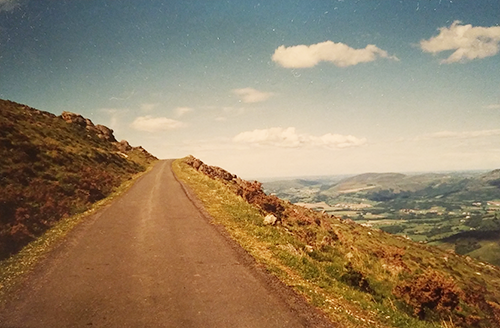
What is it cruising past you with an annoying motorized purr, unzipping from behind your ear the entire afternoon? A bee, I’ll wager.
Sometimes, it swerves to a mapped azalea preening by a hedgerow; sometimes it weaves in complicated ever-widening arcs, scenting pollen; other times, aflush, it hovers in such a tizzy over a satellite dish of petals that it hardly knows what to do except keep buzzing. Finally, it settles on a stamen. Then lifts a moment later to an adjacent splash of colour.
Nothing is forced. The bee has simply burst out of the hive into a bright world to explore widely, up close. It is how I have always thought walking, reading, and thinking should be—and research too: unhurried, whimsical, open-minded, observant.
*
Laurie Lee was an English writer best known for his autobiography Cider with Rosie, but it was the enraptured prose of his sequel—in which he hiked across Spain on foot—that sent me tramping. Laurie Lee went to Spain and walked for months; I set out on a three-day ramble outside Ottawa. It was not very exciting, but it was, at the same time, marvellous. I camped in backyards; I passed bristling cornfields; I busted a tentpole in a thunderstorm; I crossed the 417 highway and felt the contemptuous delight of youth. I lived on apples, water, bread, beans, and cheese. Then I walked home.
Three years later, I met Lee by chance at a village cricket match in Gloucestershire. In a lawn chair, under a broad-brimmed sun-hat, he leaned forward with a kindly grin. He was wise-cracking and curious and full of questions. I told him I liked the rhythm of his sentences. “I try,” he quipped. Then he asked me where “my people” were from.
“Well,” I said, “my grandmother is from Wales.”
“Wales?” He said, surprised. He looked me over. “You look more like a Viking to me—you’ve a lot to answer for!”
Not long before, in London, I’d bought a gigantic map of Spain—one of those maps so detailed you can flatten it out on the floor, and when you kneel up close you sense you could fall right into it. Soon after, I grabbed a backpack and tent and jumped on a ferry to Spain.
*
What happens when you walk or read? You enter something else. Part of what you enter is your thoughts, because you are the only subject of your life, the one who does the reading and the walking, but soon you get the feeling that, when you walk, you are walking through something both within and beyond yourself; and that when you read, you are encountering something outside your experience and knowledge: you are lost in the happiest way a human being can be lost.
In the woods, Nature takes you in. Your only job is to step gamely forward, deeply breathe, and look. And the only place I can think of at all akin to the woods is a library.
My first memory of a library was a book of Greek mythology. Lanky, dog-eared, bandaged with tape, it snoozed with several others at the bottom of an elementary school bookshelf. Cracked open, the book featured full-sized, vivid, colour prints, and an incense-like smell. An image of Persephone haunted me most—happily skipping through a meadow one moment, then falling through a crack down to Hades the next. I fell with her and feared and hated the Underworld; but in falling I also felt empathy for Demeter, her mother, who wandered the surface, agitated with grief.
With any good book you plunge like Persephone headlong into the unknown, and it is being held there awhile, braced against a wild experience or a multi-faceted thought, that you equip yourself to shoulder your pack and strike back to the surface.
In the 1990s, as an undergraduate, I began to realize I was doomed to work in a library. Back then I shelved books at the Carleton University MacOdrum Library. I loved the rows and rows of stacks; they were like a forest. Vast ranges fanned out everywhere, crammed with craggy print titles, oversized behemoths, and musty bound journals. You could pick a book up, and put it down; crouch down low and inspect another, flipping through acid-browned pages; tug the spine of a new one back so it fell in your palm like fruit. I loved the breadth of the Library of Congress classification system; the microfilm reels; the close-packed sheafs of microfiche; and the kingdom of government documents that followed a mysterious order called CODOC.
I got to know and love every floor: the grim black volumes of Sociological Abstracts, the tidy narrow issues of Foreign Policy, the crumbling Canadian Geological Survey; the Statesman’s Yearbook, House of Commons Debates, the Reader’s Guide to Literature. I knew where to find T.S. Eliot criticism, or music scores, almost instinctively: the books themselves were like the bark of trees, shrubs, or the plumage of a birds.
In the wild, you sense a space that sprawls around you; in a library, you sense that too, but vertically. Just as a creaking sequoia hints of an age beyond your own, a library is silent but constantly achatter: past and present voices interweave in a living throng of thoughts, disputes, and stories.
At the John M. Kelly Library, I still roam bookshelf ranges whenever I can. But much more often I forage in catalogues, ebooks, websites, and databases. Together, students and I swat virtual branches, wade through virtual swamps, and sometimes feel lucky after a rocky climb to glimpse a virtual view.
*
Thinking seems to me best undertaken with idleness, so that the mind can adjust to off-putting ideas, implications, connections, and consequences. Idleness, yes, and boredom: I don’t mean the lazy type but the patient kind—an appreciation of slowness as soil for understanding. Yet students are pushed to consume vast wads of text and other media; profs must sweat to publish enough to meet their tenure requirements.
New shoots in the wild feel no such pressure: they unfurl when they are ready, and why is the world any worse off for the wait?
Your blood right now is bustling through your body, drumming an urgent unrepentant metaphor for life. Wherever you are—in thought, in book, on foot—a forest stands and threatens with its welcome: birds call, squirrels start or scuttle, oak or book spines creak or crack, and the footpath meanders into mystery. I believe it, even at home, with COVID prowling the streets, and spring unzipping campus with relief in every leaf.
Read other InsightOut posts.
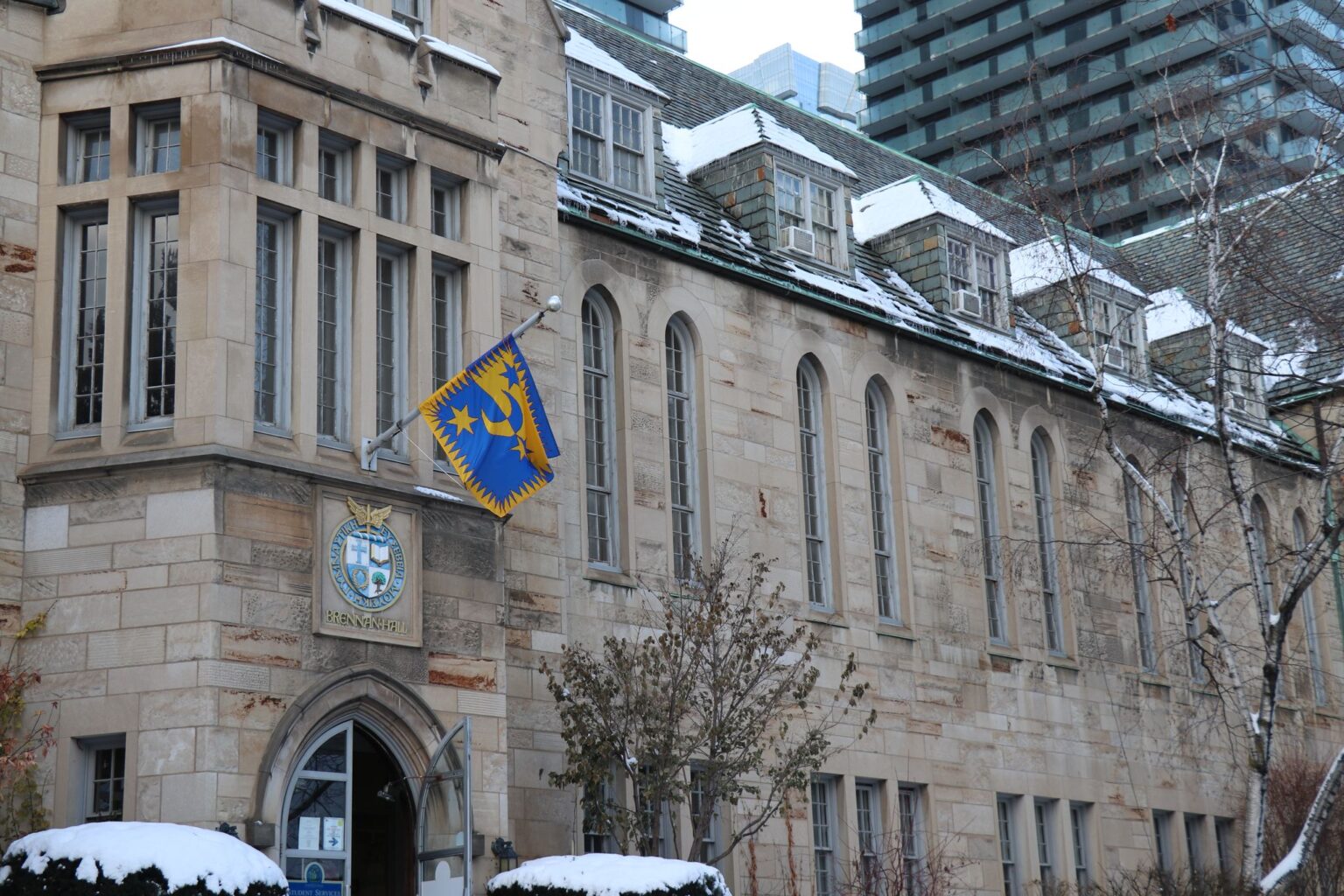
In a shifting academic year, St. Mike’s community and creativity keep students engaged
A strong reputation among students, creative, empathetic responses to the pandemic, and hosting some of the most popular undergraduate classes and programs at the University of Toronto have all helped St. Michael’s weather the challenges posed by COVID-19.
“This is a surprising story,” says Interim Principal Dr. Mark McGowan. “We planned for the worst, hoped for the best and were pleasantly surprised. We were dealt an unusual hand and staff, professors, and students responded admirably to the challenges we have been dealt.”
The result, says McGowan, is that enrolment at St. Michael’s has remained healthy, with increases in enrolment in all college courses. This, he says, is due to a number of factors. One is the ongoing popularity of St. Mike’s Book & Media Studies program, which takes an interdisciplinary approach, offering an historical investigation of the role of printing, books, reading, and electronic and digital media in cultures past and present. The program remains one of the most popular at U of T.
Another decision that has kept enrolment numbers strong was St. Mike’s rapid move to online classes, assuring students — and especially international students — that they could continue their education safely from home. At times, this has driven students to discover new interests, as demonstrated by an increase in the number of international students, for example, in Mediaeval Studies courses.
And if students can’t engage in the international travel that is a key component of programs, St. Mike’s has decided to bring the world to our classrooms. In response to the cancellation of the trips that are a key aspect of the popular first-year One seminars, St. Mike’s is creating what is being called a global classroom, allowing students in Toronto to engage virtually with research and data from around the world. Funded in part by a grant from Universities Canada, the global classroom will have dedicated space on campus, complete with cutting-edge technology, to engage with students, professors, and researchers around the world.
The Boyle Seminar in Scripts and Stories, which offers students an interdisciplinary approach to examining the Celtic influences in the mediaeval world, with particular focus on early books and historical artifacts, will be the first to use the concept, partnering with Maynooth University in Ireland. Students here and in Ireland will engage with their peers, accessing digital resources from both universities. With the plan that student travel will resume once travel bans are lifted, the virtual classroom lends itself to any number of courses and programs, as well as a hybrid model of virtual and in-person classes.
Along with the university’s outstanding faculty members, a roster of strong sessional instructors has drawn students to enrol at St. Mike’s courses. In Book & Media Studies, for example, award-winning journalist Michael Valpy has returned to St. Michael’s to teach media ethics while journalist, scholar and activist Emilie Nicolas is teaching a new #BlackLives and the Media course. In Celtic Studies, meanwhile, Shane Lynn is teaching modern Irish History, a course whose numbers have been growing steadily.
But one of the biggest strengths that allows St. Michael’s to remain vibrant is a strong reputation for a student-driven approach, McGowan says.
“Student word of mouth focusses on things like how well the students are treated at St. Mike’s, or small class sizes,” he says.
This academic year has highlighted the care faculty and staff have for students, he says, noting, for example, how impressed he was when he sat in on a regularly scheduled Zoom session, organized by librarian James Roussain, Dr. Iris Gildea and Dr. Felan Parker, for professors to talk about student issues and how best to offer support.
“It is edifying to listen to compassionate professors focussed on being merciful, especially during COVID,” he says.
Underpinning classes and communication is a strong commitment to IT, the interim principal says. To help ensure smooth delivery of classes, the Principal’s Office offered faculty members funding to upgrade equipment to better serve students online. McGowan also credits St. Mike’s IT Supervisor Pio Sebastiampillai , working with the team at the Faculty of Arts & Science, with enabling professors and students to make the best of online learning.
And while in-person events are still not happening, enhanced student experiences continue to happen. This year, for the example, the annual USMC Research Symposium will still take place, online, on Saturday, March 13, on the topic of “Community, Citizenship, and Belonging.”
St. Mike’s also continues to engage with the important matters of the day. For example, the popular Truth and Reconciliation Commission Reading Group, started by Dr. Reid Locklin in 2019, moved online this year so that the university community can learn how it can better engage in the recommend, holding its meeting recently and welcoming everyone to future sessions when they resume in the next academic year.
“St. Mike’s responded well,” McGowan says. “We didn’t panic but worked as a team.”
James Roussain begins a new role at the John M. Kelly Library this January as the Interim Head of Public Services, a change from his position as Outreach and Instruction Archivist, which he has held since 2017. Prior to joining the University of St. Michael’s College, James worked at Scotiabank, where he was involved in the maintenance and deployment of the corporate records management program. At the Kelly Library, James assists students with their research, exposes students to the treasures in the Kelly Library’s Special Collections, and teaches in the college’s Book and Media Studies program. James is a past president of the Archives Association of Ontario (AAO) and the Toronto Area Archivists’Group (TAAG). In his spare time, he is pursuing a Master of Education in Higher Education at the Ontario Institute for Studies in Education (OISE). He holds a Master of Information degree from the University of Toronto’s Faculty of Information.
On Jellyfish, Loneliness, and Learning
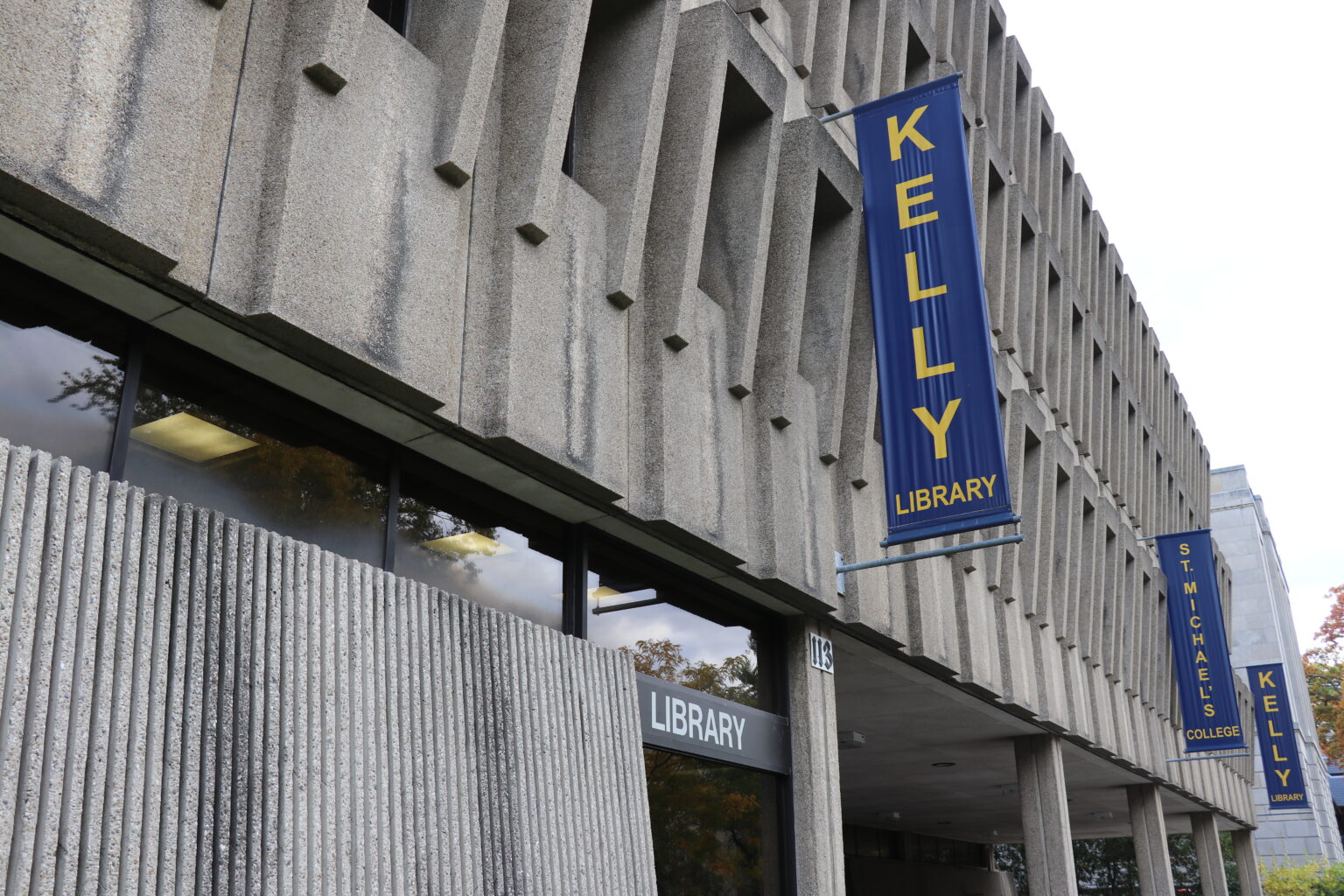
As the new semester gets under way in the coming days, it is important to take a step back and think about those we are working to support: our tireless and dedicated students. With our new reality of living apart and working remotely becoming just that—our current reality—we need to remember that these are indeed strange and stressful times not just for us but for our students, too. As a librarian at the Kelly Library, I am fortunate to work directly with students assisting them in their research, writing, or in navigating the complexities of the University of Toronto’s immense library system. For many, the library is an intimidating space in the best of times. Compounded with the challenges of remote work and a lack of helping hands, finding resources and completing research has never been more challenging, especially so for many of our first-year students, for whom the academic library is an entirely new entity.
During the fall semester, the Kelly Library, in partnership with the Principal’s Office, hosted twice-weekly Research and Writing Help Drop-In sessions, where students were able to join us—remotely—for one-on-one assignment help. With two writing instructors at my side, we would greet students and, using private break-out rooms, answer as many questions as possible over a two-hour period. What started off as a way to accommodate students who were unable to snag longer scheduled appointments grew into a window on our students’ lived reality: too many due dates, a mess of assignments vying for their attention, and an overwhelming sense of isolation and, at times, loneliness. Logging in from their living rooms, kitchens, bedrooms, and sometimes an enviable patio, students shared with us their frustrations in working alone and, for many, navigating time zones and poor internet connections. This has not been an easy time.
As I helped students find articles, tidy up citations, or figure out the best keywords for their upcoming essay on, say, vestigial traits in jellyfish, I grew to realize two things. The first—and perhaps sacrilege to our faculty readers—is the trivial nature of our work during these incredibly challenging times. In more than one occasion I felt the need to reassure students that while, yes, your essay is important, so too is the need to care for yourself and reach out to others. This is not to say we must lessen academic rigour, but rather carry a realistic understanding of what is possible. The second thing I learned is how little I know not only about jellyfish but about every single topic brought to me during these drop-in sessions. The level of academic achievement on our campus is truly astounding. There has not yet been a case where working with a student on their research has not taught me something new, and for that I am thankful.
In looking ahead to the coming semester and the challenges it will surely bring to our students, especially those graduating into a world of social, political, and simply logistical unknowns, we need to work together to ensure empathy and perspective are at the front of our minds. The rise of mental health programs and services on campus—so well advocated for by our dedicated students on SMCSU—brings overdue awareness to the importance of creating community wherever possible. Week after week, soon after logging in, the same group of students would join our drop-in sessions. Some came for detailed questions on style and structure, while others came just to check in. We created community in the most unlikely of places: a Zoom call focused on academic research and writing help. Who knew? In our own unique way we forged a space where students could share their frustrations, get some help, and see a familiar face at the same time. It is easy to get caught up in administrative matters, the daily to-and-fro of emails and meetings, or the challenges of bureaucracy. Take a moment, as often as possible, to guard against these blinders and seek our community. Or, if so inclined, check in with our students and ask them how they are doing. What may be seen as a hollow “How’re you?” during pre-COVID times may now carry more weight than you know.
While the library’s stacks are closed for the time being, our dedicated staff remains available to help. We strive to place the student experience at the centre of our work and tailor our collections, services, and spaces to offer them an inclusive, welcoming, and supportive environment—both in a physical and virtual sense—where they can flourish during their time on campus. In my own role within the library, and my small role on the University of Toronto campus, I am proud to have the opportunity to work daily with our students and to learn alongside them.
Read other InsightOut posts.
November 2, 2020
A generous gift from the Henri Nouwen Legacy Trust to the University of St. Michael’s College will help make the work of the beloved spiritual writer more accessible to researchers and readers around the world.
The funding will support a 12-month contract for an archivist to process the Henri J. M. Nouwen holdings in the Archival and Manuscript Collection housed in the university’s John M. Kelly Library. A search to fill the position is now under way.
Working with library staff, the archivist will handle the preservation, arrangement, and description of various materials, as well as promote their existence and add them to web-based finding guides. The position holder will also digitize materials so that the wealth of books, letters, promotional and related materials in the collection will be easier to access.
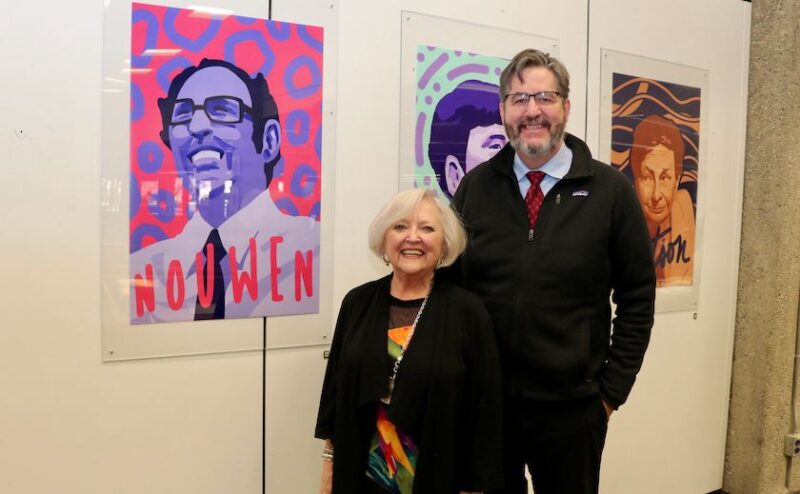
“We have always been grateful for our partnership with St. Michael’s, and this position will help open up Henri to a whole new generation,” says Karen Pascal, who is the Executive Director of the Toronto-based Henri Nouwen Society. “Henri’s writings touched people’s hearts, and demonstrated that vulnerability is part of leadership. As St. Mike’s works to create new leaders, this is a perfect fit.”
University President and Vice-Chancellor David Sylvester is delighted for the continued partnership the funding acknowledges between the society and St. Michael’s.
“The University recognizes and appreciates that this gift builds on the Nouwen Society’s longstanding support of the collection, and we share the commitment to ensuring the collection is preserved and made available to scholars, students and the wider community,” he says. “We look forward to welcoming the new archivist, and to continuing the conversation about other possible partnerships.”
More than 100 researchers accessed the popular collection last year, and John M. Kelly Library Archivist Simon Rogers notes that the funding from the Nouwen Legacy Trust will help to increase the discoverability of its materials. It may become possible “to surface previously unprocessed materials including photographs, audio-visual archival materials, personal correspondence and oral history recordings,” he says.
“We are excited that we are going to be able to give focused attention to these materials, allowing broader engagement for the larger Nouwen community,” Rogers says, adding that the library archive anticipates new materials, including letters and photos, to be added to the collection soon.
A priest, pastor, professor and writer, Henri Nouwen was born in Holland in 1932. A prolific author, he produced dozens of books of spiritual reflections during his life, with more than seven million copies of his works sold. His writings were varied, reflecting on everything from Rembrandt’s depiction of The Prodigal Son through to Thomas Merton, the topic of aging, and a sabbatical year Nouwen spent living at a Trappist monastery in upstate New York. His vast career saw him teach at Harvard and Yale’s divinity schools and live with communities on the margins of society. He spent his final years at L’Arche Daybreak, a community for people with developmental disabilities, just north of Toronto. He died in 1996.
Sr. Susan Mosteller, C.S.J., who served as executrix of Nouwen’s estate, donated the archival material to the Kelly Library in January, 2000, and the archives were officially opened later that year. With a mandate to collect, preserve, and support archival material on Nouwen, the archives hold more than 16,000 letters, various sound and video recordings, a complete set of his published books—including translations—and a comprehensive collection of articles published by Nouwen between 1957 and 1996.
“Henri died before the explosion of the Internet,” says Pascal. “He was a prolific letter writer and felt letters were part of his ministry. He wrote to all sorts of people. Accessing more of these letters, for example—and making them available to researchers—will teach us so much about him, because there’s still so much to learn.”
Noel McFerran has worked as a librarian at the University of St. Michael’s College since 1998. His current position is Theology and Rare Books Librarian.
“Be Right Back!”
I spent last Wednesday morning in the Kelly Library providing curbside pickup service to faculty and students. As a librarian, it was exciting for me to see the library taking further steps to provide library materials to patrons while maintaining the health and safety of everybody involved.
Since mid-March I’ve been working from home, keeping very busy responding to emails from faculty and students about their course work and research. Wednesday was one of my first times back inside the Kelly Library. The most important thing was to be trained in how to function in my regular work environment during a pandemic. I thought that I knew all about social distancing, wearing masks, and sanitizing hands—but it’s so much more important in a workplace where there are other staff using the same desk and equipment. Just like in the supermarket, we’re maintaining a one-way route in the library in order to reduce face-to-face encounters between staff.
Every day the Kelly Library receives a computer-generated list of books and DVDs which patrons have requested through the UofT Library Catalogue. One staff person looks for these items on the shelves. Most items are where they are meant to be, but occasionally we have to search for something which has wandered from its regular home. Items then get checked out to patrons. Right now all items are signed out until September 18, 2020.
Another Kelly staff person, working from home, sends personalized emails to patrons telling them that their books are ready to pick up. Sometimes patrons respond with special requests (e.g. “Can a friend get my books for me?”).
At present patrons can pick up their requested items at the Kelly Library anytime Monday to Friday between 9:00 a.m. and 4:00 p.m. The pick-ups ebb and flow. I filled the low periods with other library work to keep myself busy.
The first encounter between a library patron and staff is through a glass wall where the patron shows their library card. (I had real difficulty reading the card through the glass, so I might need to make an appointment for an eye exam!) You can’t really hear people on the other side of the glass, so we have various printed signs which communicate the most frequent things (like “Be right back”).
Staff retrieve the patron’s bag of books and place it on a table outside the library under the overhang. Even then there is reduced interaction between staff and patrons. Smiling doesn’t mean so much when you’re wearing a mask, so I tried to wave in a friendly way.
The response from faculty and students to the Kelly Library’s curbside pickup service has been very positive. My colleague Risa de Rege, who has worked many shifts in the past week tells me, “People have been very grateful that we’re offering curbside pickups, and are also respectful of our space and policies.” In the first week, 76 patrons submitted requests for 141 items. As more people learn about the service and how easy it is to use, that number is likely to increase. So far, though, we’ve been able to respond quickly to requests.
Nobody wants the COVID pandemic to go on any longer than it has to. But for the present and near-future, the Kelly Library is developing solutions to continue to provide library service to our faculty and students. I love being a part of that, knowing that my work contributes in a small way to the academic success of others.
Read other InsightOut posts.

